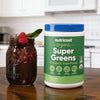7 Strange Supplements with Scary Good Health Benefits

It’s that time of year again! The leaves are turning orange, and the hot summer sun has been traded in for crunchy leaves, hot chocolate, and scary movies.
But you know what shouldn’t be scary this Halloween? Your supplements! Health supplementation, while rooted in traditional practices, has only recently broken into the mainstream. Many supplements have become household names, but still many more remain relatively unknown.
So, to celebrate Halloween, we’ve put together this list of 7 “strange” supplements that more people should know about!
Enjoy!
Astaxanthin
Besides being almost impossible to spell on the first try, astaxanthin is a powerful natural antioxidant found in trout, microalgae, yeasts, shrimp, and salmon. It is also a carotenoid pigment, so if you’ve ever wondered what gives salmon its pinkish color, astaxanthin is your answer.
As an antioxidant, astaxanthin neutralizes free radicals and may lead to positive health outcomes such as improved skin health, heart health, and joint support. It can also assist in lowering oxidative stress in smokers and overweight people.

One study comparing astaxanthin with other carotenoids found that astaxanthin displayed the highest antioxidant activity against free radicals.
Ox Bile
Here’s one that’s sure to turn a few stomachs. Ox bile may sound like nothing you’d want to put inside you, but in reality, ox bile has been a staple of eastern medicine since ancient times.
Bile is a fluid made in the liver and stored in our gallbladder which helps with the digestion of fat in our bodies. Bile also helps us to absorb fat-soluble vitamins like A,D,E, and K.
Abnormal conditions such as hormone imbalances or disease in the pancreas or liver can lead to a bile salt deficiency in the gut. This can prevent our body from properly absorbing necessary nutrients and can even lead to increased accumulation of fats.
Ashwagandha
Ashwagandha is an ancient medicinal herb which has been used for more than 3000 years to relieve stress, increase energy levels, and improve concentration.

Additionally, ashwagandha paste was used to reduce joint inflammation.
The name “ashwagandha” is a Sanskrit word used to describe the smell of a horse. The name refers both to the herb’s unique aroma as well as its traditionally held ability to increase strength and vigor.
Ginkgo Biloba
Ginkgo Biloba is a tree native to China. Sometimes called maidenhair, ginkgo biloba is a relic of another age, the last surviving member of an ancient order of plants. For this reason, it is sometimes called a living fossil.
Extract from ginkgo biloba leaves has been shown to contain high levels of flavonoids and terpenoids. These compounds are renowned for their powerful antioxidant properties.
Some studies suggest that ginkgo biloba may be an effective treatment for anxiety and depression. Others link its use to improved heart and brain functioning.
Though more research is necessary to confirm the benefits of ginkgo biloba, its role in the Chinese medical tradition stretches back thousands of years.
Resveratrol
Here’s one that you may be familiar with. Resveratrol is a compound which is largely responsible for the health benefits associated with drinking red wine. Resveratrol is present in the skin of grapes which is included in the fermentation process. The result is high concentrations of resveratrol in red wine.
Resveratrol possesses antioxidant properties and has been shown to be a promising supplement for lowering blood pressure. Other studies have shown that resveratrol is able to inhibit cancer in all three of its stages: initiation, promotion, and progression.
Other potential benefits include protection against age-related cognitive decline. In fact, resveratrol has even been associated with longer life expectancy.
Krill Oil
Krill oil is a source of omega-3 fatty acids. It is a fish oil alternative and, like fish oil, is rich in the two most important omega-3s, DHA and EPA. These omega-3s are only found in seafood and can be plentifully obtained from eating the recommended 8 ounces of seafood a week.
Research on krill oil shows that it may help decrease inflammation. This means that it may be useful in relieving symptoms of conditions such as arthritis, joint pain, and even premenstrual syndrome.
According to one study, “It appears that omega-3 fatty acids may reduce the psychiatric symptoms of PMS including depression, nervousness, anxiety, and lack of concentration and may also reduce the somatic symptoms of PMS including bloating, headache and breast tenderness.”
So why use krill oil instead of fish oil? Well, some studies suggest that krill oil may be more effective than fish oil when it comes to increasing omega-3 levels in the body.
Dong Quai
Dong Quai is a fragrant plant common in eastern medicine. Like other entries on this list, its use can be traced back thousands of years. Traditionally, dong quai has been used by women to balance hormones and treat symptoms of menopause.

One of these symptoms is osteoporosis, a condition characterized by weak bones. Some research even shows that Dong Quai may help promote bone cell formation and lead to stronger bones.
While research is relatively sparse, what exists suggests that dong quai may also help women treat depression as well as provide relief from menstrual cramping.
Wrapping Up
So there you have it!
The world of health supplements can be daunting, at times. If you haven’t found what’s right for you, doing a little digging can unearth hidden gems, many of which have histories thousands of years long and belong to rich medical traditions.
Just remember, don’t be scared if they seem a little weird at first glance.
Happy Halloween!
Sources
https://pubmed.ncbi.nlm.nih.gov/10775364/
https://pubmed.ncbi.nlm.nih.gov/22214255/
https://pubmed.ncbi.nlm.nih.gov/19633611/
https://pubmed.ncbi.nlm.nih.gov/16808927/
https://pubmed.ncbi.nlm.nih.gov/25642989/
https://pubmed.ncbi.nlm.nih.gov/16492481/
https://www.ncbi.nlm.nih.gov/pmc/articles/PMC5465813/
https://pubmed.ncbi.nlm.nih.gov/22396249/
https://www.ncbi.nlm.nih.gov/pmc/articles/PMC4030174/
https://pubmed.ncbi.nlm.nih.gov/27144581/
https://pubmed.ncbi.nlm.nih.gov/26357480/
https://pubmed.ncbi.nlm.nih.gov/27279841/
https://pubmed.ncbi.nlm.nih.gov/17353582/
https://pubmed.ncbi.nlm.nih.gov/23642943/
https://www.ncbi.nlm.nih.gov/pmc/articles/PMC4123376/
https://pubmed.ncbi.nlm.nih.gov/16691630/
https://www.ncbi.nlm.nih.gov/pmc/articles/PMC5014956/
-
Posted in
Antioxidants, Cognitive Health, Joint Health











